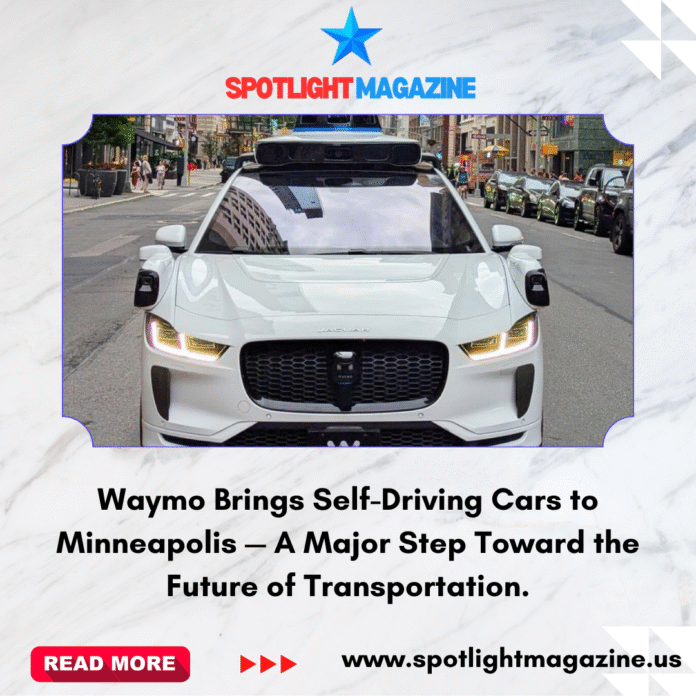Self-driving cars are officially arriving in Minneapolis, marking a major step forward in the city’s transportation future. Waymo, the autonomous vehicle company owned by Google’s parent company Alphabet, has announced that its driverless cars will begin operating on Minneapolis streets starting Thursday morning. The company says it is introducing a combination of its Jaguar I-PACE vehicles and its new Zeekr RT models as part of early groundwork toward eventually offering full driverless ride-hailing services in Minnesota’s largest city.
Waymo says it has spent years preparing its technology for harsh winter conditions, knowing that Minnesota’s snowy climate poses unique challenges. The company has tested its cars in locations with heavy snowfall, including Michigan’s Upper Peninsula, California’s Sierra Nevada mountains, and areas of Upstate New York. It says this preparation has helped strengthen its ability to operate safely in tough weather and continue improving the reliability of its autonomous driving systems.
Minnesota lawmakers and safe-driving advocates have welcomed Waymo’s arrival, describing it as a major chance to modernize transportation. Members of the Minnesota House Transportation Finance and Policy Committee, including both Republican Rep. Jon Koznick and Democratic Rep. Erin Koegel, praised the move. They said that adding safe and proven autonomous vehicles could support the state’s long-term goals of building a cleaner, more efficient, and more connected transportation network. They also emphasized that any expansion of self-driving technology must be done responsibly, with a strong focus on safety.
Support also comes from groups like Mothers Against Drunk Driving (MADD). Lauren Johnson, the regional executive director for MADD in Minnesota, said the organization has worked closely with Waymo and believes autonomous vehicles can help reduce impaired driving. She expressed confidence that cleaner, independently operated cars could make roads safer for drivers, passengers, pedestrians, and the broader community.
But despite the excitement surrounding self-driving technology, there are still questions about how ready these vehicles are for everyday use. Waymo has faced criticism over several incidents during real-world testing in different cities. Earlier this year, a Waymo car near Atlanta failed to yield to a school bus with flashing red lights. In San Francisco, a police officer stopped a Waymo vehicle after it made an illegal U-turn, causing confusion because the car had no human driver behind the wheel. In May, the company recalled over 1,200 of its vehicles due to a software problem that caused cars to collide with objects like chains, gates, and other barriers.
Waymo, however, argues that its safety data shows clear benefits compared to human drivers. According to the company, its autonomous vehicles have resulted in 91% fewer serious injury crashes and 92% fewer pedestrian-injury crashes. The company says these improvements show the potential for autonomous technology to significantly reduce road accidents and save lives.
Still, experts urge caution. Robert Sumwalt, former chairman of the National Transportation Safety Board and current CBS News transportation safety analyst, has repeatedly pointed out that self-driving technology is not yet perfect. He compared the current stage of autonomous driving to attempting to launch a rocket to the moon in 1910, when aviation itself was still new. Earlier this month, he advised that companies like Waymo must be held to higher safety standards and that any rollout of autonomous vehicles must be handled carefully and responsibly. Until then, he believes widespread adoption should remain limited.
Waymo’s new presence in Minneapolis marks an important moment in the state’s push toward innovation. As the vehicles begin navigating city streets, Minnesotans will be watching closely to see whether this latest step in transportation technology proves to be a safe and effective option for the future. WCCO has reached out to the Minnesota Department of Transportation for additional comments.


